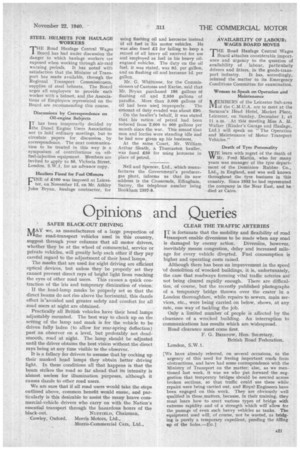Opinions and Queries
Page 23

If you've noticed an error in this article please click here to report it so we can fix it.
' SAFER BLACK-OUT DRIVING 'MAY we, as manufacturers of a large proportion of IVIthe road-transport vehicles used in this country, suggest through your columns that all motor drivers, whether they be at the wheel of commercial, service or private vehicles, will greatly help each other if they pay careful regard to the adjustment of their head lamps.
The masks that are used for night driving are efficient optical devices, but unless they be properly set they cannot prevent direct rays of bright light from reaching the eyes of other road users. This causes a quick contraction of the iris and temporary diminution of vision.
If the head-lamp masks be properly set so that the direct beams do not rise above the horizontal, this dazzle effect is'avoided and greater safety and comfort for all road users at night are obtained.
Practically all British vehicles have their head lamps adjustably mounted. The best way to check up on the setting of the lamp and mask is for the vehicle to be driven fully laden (to allow for rear-spring deflection) past an observer on a level, but preferably not deadsmooth, road at night. The lamp, should he adjusted until the driver obtains the best vision without the direct rays being at any time visible to the observer.
It is a fallacy for drivers to assume that by cocking up their masked head lamps they obtain better driving light. In these conditions all that happens is that the beam strikes the road so far ahead that its intensity is almost useless for illumination purposes, although it causes dazzle to other road users.
We are sure that if all road users would take the steps outlined above, common benefit would ensue, a.nd particularly is this desirable to assist the many brave commercial-vehicle drivers who carry on with the Nation's essential transport through the hazardous hours of the black-out. NUFFIELD, Chairman, Cowley, Oxford. Morris Motors, Ltd.,
Morris-Commercial Cars, Ltd., CLEAR THE TRAFFIC ARTERIES
I T is fortunate that the mobility and flexibility of road transport enable diversions to be made when any road is damaged by enemy action. Diversion, however, inevitably means congestion, delay and increased mileage for every vehicle diverted. Fuel consumption is higher and operating costs raised.
Although there has been an improvement in the speed of deniolition of wrecked buildings, it is, unfortunately, the case that roadways forming vital traffic arteries are
not being cleared rapidly enough. There are difficulties, of course, but the recently published photographs of a temporary bridge thrown over the crater in a London thoroughfare, while repairs to sewers, main services, etc., were being carried on below, shows, at any rate, one way of tackling the job.
Only a limited number of people is affected by the clearance of a wrecked building. An interruption to communications has results which are Widespread.
Road clearance must come first.
F. G. Bnisrow, Hon. Secretary, British Road Federation.
London, S.W.1.
[We have already referred, on several occasions, to the urgency of this need for freeing important roads from obstructions, and have had some correspondence with the Ministry of Transport on the matter; also, as we mentioned last week, it was we who put forward the suggestion that temporary bridges should be erected across broken sections, so that traffic could use these while repairs were being carried out, and Royal'Engineers have been engaged on this work. They are obviously well qualified in these,matters, because, in their training, they must learn how to erect various types of bridge with extreme rapidity and of a strength which will allow for the passage of even such heavy vehicles as tanks. The equipment used will, of course, not be wasted, as bridging is purely a temporary expedient, pending the filling up of the holes.—En.]




















































